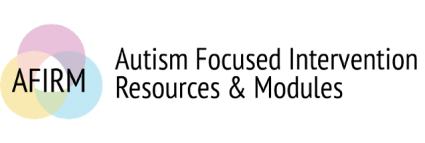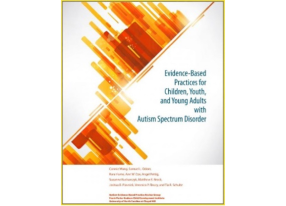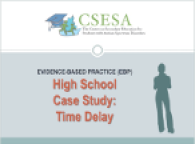Resources
Featured Resources

Autism Focused Intervention Resources & Modules
In 2014, the NPDC identified 27 evidence-based practices in a systematic review of the literature published from 1990-2011. From the 27 EBPs identified, the NPDC developed online modules, called the Autism Focused-Intervention Resources and Modules (AFIRM). Each module will guide the learner through how to use the practice by focusing on the three specific steps of planning, using, and monitoring. Overall, AFIRM users find the AFIRM modules and resources to be high-quality, useful, and relevant to their work with learners on the spectrum (Sam et al., 2019).

2020 NCAEP Evidence-Based Practices Report
The 2020 EBP report from the National Clearinghouse on Autism Evidence and Practice that supports the identification of 28 ASD evidence-based practices.
Citation: Steinbrenner, J. R., Hume, K., Odom, S. L., Morin, K. L., Nowell, S. W., Tomaszewski, B., Szendrey, S., McIntyre, N. S., Yücesoy-Özkan, S., & Savage, M. N. (2020). Evidence-based practices for children, youth, and young adults with Autism. The University of North Carolina at Chapel Hill, Frank Porter Graham Child Development Institute, National Clearinghouse on Autism Evidence and Practice Review Team.
Coaching with Evidence-based Practices
Coaching is a key ingredient of the NPDC model to enhance the implementation of EBPs, facilitate the assessment of learners, and to evaulate the effectiveness of selected EBPs. The NPDC has created a Coaching Manual, Coaching Logs, a Coaching Presentation, and Coaching videos to support the use of coaching.
Coaching Manual
The Coaching Manual supports practitioners’ implementation of evidence-based practices by describing the roles and responsibilities of coaches, types of coaching, elements of effective coaching, and guidelines for providing content on coaching through professional development.
- Coaching Manual (PDF, 4MB)
Coaching Log
The Coaching Log is used by the coach and inviting partner to document the cyclical and evolving process of coaching and its outcomes.
- TA Contact Form / Coaching Log (PDF, 430 MB)
Coaching Presentation
The Coaching presentation is designed to be presented in about 1 hour. The presentation details information from the Coaching Manual combined with experiential learning activities.
- Coaching Presentation (PPT, 1 MB)
Coaching Videos
The NPDC developed videos to support self-study and the development of professional development supports for others.
- School Administrators Reflect on Coaching
- The Coaching Process: Implementation of Picture Exchange Communication System (PECS)
- The Coaching Process: Igloo
- The Coaching Process: Coaching the Coach through Reflective Consultation
Monitoring Progress
The Goal Attainment Scaling (GAS) assists with monitoring the progress of learning a skill or modifying a behavior of a learner. At regular points throughout the academic year, learner progress is gauged using the GAS. An important part of the GAS process is establishing the present level of performance so that the benchmarks that are set toward achieving the goal or outcome are specific, clear, and observable. The final rating summarizes the learner’s progress relative to the expected annual goal or outcome. If a learner is not benefiting from the selected EBP, a new EBP can be selected and implemented.
Additional Resources

Evidence-Based Practices for Children, Youth, and Young Adults with Autism Spectrum Disorder
View the 2014 NPDC EBP report that supports the identification of 27 ASD evidence-based practices and includes fact sheets for each EBP (Wong, et al, 2014). Read more about the comprehensive review in the article appearing in Journal of Autism and Developmental Disorders. Please utilize your local academic library to locate this copyrighted material.
Citation: Wong, C., Odom, S. L., Hume, K. A., Cox, C. W., Fettig, A., Kurcharczyk, S., et al. (2015). Evidence-based practices for children, youth, and young adults with autism spectrum disorder: A comprehensive review. Journal of Autism and Developmental Disorders. Advance online publication. doi: 10.1007/s10803-014-2351-z

EBP Case Studies developed by the Center on Secondary Education for Students with Autism Spectrum Disorder (CSESA) Online case studies that apply specific evidence-based practices to autistic high school students

